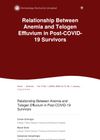 3 citations,
August 2022 in “JAAD international”
3 citations,
August 2022 in “JAAD international” Taking a daily multivitamin may be enough to promote hair growth in people with alopecia.
3 citations,
February 2017 in “The American journal of medicine” A woman's heart failure improved after she added vitamins and changed her diet from only cheese chips and cake.
 July 2024 in “Skin Appendage Disorders”
July 2024 in “Skin Appendage Disorders” The supplement significantly improves hair density and appearance in people with hair loss.
 April 2024 in “Nigerian Postgraduate Medical Journal”
April 2024 in “Nigerian Postgraduate Medical Journal” Androgenetic alopecia is a common hair loss condition influenced by various factors and linked to psychosocial and cardiovascular issues.
180 citations,
October 2019 in “British journal of haematology” Early detection and treatment of iron deficiency in pregnancy are crucial for maternal and infant health.
 5 citations,
May 2023 in “Frontiers in immunology”
5 citations,
May 2023 in “Frontiers in immunology” Environmental factors like diet and vitamin levels, especially Vitamin D, can affect autoimmune diseases differently, with lifestyle changes potentially improving outcomes.
 3 citations,
November 2020 in “Curēus”
3 citations,
November 2020 in “Curēus” A child's hair loss from alopecia areata was fully reversed in five months using diet and supplements.
 61 citations,
May 2010 in “Integrative Cancer Therapies”
61 citations,
May 2010 in “Integrative Cancer Therapies” There is no clear recommendation for using selenium in cancer patients; it may be beneficial to correct low selenium levels before treatment.
166 citations,
November 2008 in “Expert Review of Endocrinology & Metabolism” Biotin and biotinidase are essential to prevent health issues, and deficiencies require lifelong supplementation.
 December 2024 in “Nutrients”
December 2024 in “Nutrients” Skin, hair, and nail changes can help detect eating disorders early.
October 2020 in “Indian journal of forensic medicine and toxicology” Iron deficiency is a common nutritional cause of hair loss.
Taking supplements after sleeve gastrectomy surgery can reduce hair loss by addressing nutritional deficiencies.
66 citations,
November 1997 in “Nutrition” One-third of patients on home nutrition had micronutrient deficiencies, with iron deficiency being most common, but serious issues were rare.
11 citations,
October 2020 in “Sultan Qaboos University medical journal” Bariatric surgery helps with weight loss but can cause complications and nutritional deficiencies.
54 citations,
April 2007 in “Gastroentérologie clinique et biologique” Bariatric surgery can worsen nutritional deficiencies, requiring careful monitoring and supplementation.
 July 2023 in “Dermatology practical & conceptual”
July 2023 in “Dermatology practical & conceptual” Low hemoglobin levels are significantly correlated with hair loss in women with Telogen Effluvium.
 January 2017 in “International journal of clinical & experimental dermatology”
January 2017 in “International journal of clinical & experimental dermatology” Eating a balanced diet with vitamins, micronutrients, and antioxidants is important for hair health and can help with hair loss.
 September 2023 in “F&S reports”
September 2023 in “F&S reports” PCOS may increase the risk of mental health issues like depression and anxiety.
January 2022 in “Indian journal of paediatric dermatology” Children with early graying hair might have lower levels of certain nutrients like zinc, magnesium, and Vitamin B12.
 3 citations,
November 2020 in “Biological Trace Element Research”
3 citations,
November 2020 in “Biological Trace Element Research” Men with hair loss may lack zinc, copper, and vitamin D; supplements could help.
 63 citations,
May 2017 in “American Journal of Clinical Dermatology”
63 citations,
May 2017 in “American Journal of Clinical Dermatology” People with alopecia areata often have lower levels of vitamin D, zinc, and folate, but more research is needed to understand if supplements can help treat it.
 5 citations,
March 2018 in “Advances in integrative medicine”
5 citations,
March 2018 in “Advances in integrative medicine” A 23-year-old woman with Hashimoto’s thyroiditis improved significantly after a 15-month integrative treatment plan.
 7 citations,
January 2017 in “Journal of cosmetology & trichology”
7 citations,
January 2017 in “Journal of cosmetology & trichology” Good nutrition is crucial for healthy hair and can help with hair loss without medication.
 January 2025 in “Dermatology Practical & Conceptual”
January 2025 in “Dermatology Practical & Conceptual” Anemia increases the risk of hair loss in post-COVID-19 survivors.
 November 2023 in “Biology”
November 2023 in “Biology” Lower hair copper and copper-to-zinc ratio are linked to more severe coronary artery disease.
 79 citations,
January 2017 in “Dermatology practical & conceptual”
79 citations,
January 2017 in “Dermatology practical & conceptual” Correcting nutrient deficiencies may help with hair loss, but the benefits of supplements without a deficiency are uncertain and could be harmful.
 December 2021 in “Dermatology research”
December 2021 in “Dermatology research” Low levels of vitamin B12, ferritin, and calcium are linked to premature graying of hair.
 70 citations,
June 2010 in “Clinics in Dermatology”
70 citations,
June 2010 in “Clinics in Dermatology” Certain groups may need vitamin supplements to improve hair health and prevent other health problems.
 January 2015 in “Springer eBooks”
January 2015 in “Springer eBooks” Chronic kidney disease can cause hair loss, which may be related to zinc deficiency or certain medications, and sometimes hair grows back when the underlying issue is treated.
 November 2023 in “International Journal of Trichology”
November 2023 in “International Journal of Trichology” No significant link between hair loss and iron or thyroid levels was found, but checking for deficiencies might still be useful.





















